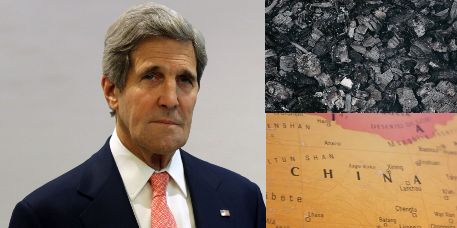
John Kerry: Zero Emissions by China and US (and Rhode Island) Not Enough
Last week came the good news (for our electric bills) that Rhode Island Energy, formerly National Grid, had declined the Revolution Wind 2 offshore wind proposal.
A week prior, John Kerry, President Biden’s Special Presidential Envoy for Climate, departed from China without accomplishing his mission; namely, to
… use climate co-operation to redefine their [US and China’s] troubled relationship and lead the way in tackling global warming
By having both countries give up their reliable, reasonably priced fuel source, of course. But did you know that Mr. Kerry has stated previously that even if the two biggest emitters of manmade greenhouse gases, China (27%) and the United States (11%) gave up fossil fuels and somehow achieved zero emissions, it wouldn’t stop global warming?
“The United States could go to zero tomorrow—I mean we can’t but if you’re figuratively speaking could go to zero—we’d still have a problem. The world would still have a problem,” Kerry told Washington Post columnist Jonathan Capehart. He continued, “If China went to zero tomorrow with the United States, we’d still have a problem. So every country has to come to the table. This is the single biggest multilateral, global negotiation that the world has ever needed.”
Quite the startling statement by someone whose anthropogenic global warming (AGW) credentials are impeccable. In fact, the consensus among AGW advocates and scientists, including the IPCC, is that all countries must go to zero emissions to avoid catastrophic consequences.
Here’s the problem. In that case, the effort to stop global warming DOESN’T GET OUT OF THE STARTING BLOCK. The biggest generator of manmade greenhouse gas, China, will not participate. So there is no point in any other country, much less the smallest state in the second biggest emitter, abating a single molecule of any greenhouse gas.
Here’s the situation with China. AGW advocates in the United States like to brag about all of the renewable energy that China has recently brought on line. But the reality is that China takes an all-source approach to its power needs, cranking both renewables and fossil fuel production. And in the absence of an inexpensive, reliable substitute, the government of China will never give up fossil fuels, the biggest component of their (and many countries’) energy portfolio.
Is this because the government believes this is in the best interest of its citizens? Well, sort of. More immediate, though, is the implication to its political power. Russian-British comedian and social commentator, Konstantin Kisin, explains this plainly in the course of his remarks to the Oxford Union mid-January. Of the 120 million Chinese people who currently suffer from malnutrition, Kissin succinctly observed,
You’re not going to get them to stay poor.
Because the lack of reasonably priced, reliable energy correlates directly to widespread poverty and malnutrition. Which, in turn, would directly correlate to a loss of political power for the current leaders of China. Kisin continued,
And you know that the main thing you have to do to survive and to stay in power is to deliver the one thing that the people of China want: prosperity, economic growth. Where do you think climate change ranks on Xi Jinping’s list of priorities?
In short, the biggest generator of greenhouse gases will not relinquish fossil fuels because that would mean relinquishing political power.
And we are watching this happen in real time. Far from eschewing fossil fuels, China has increased their coal powered energy production, as NPR reported earlier this year. In fact,
China has six times as much [coal] plants starting construction as the rest of the world combined.
That China has concurrently boosted solar and wind production doesn’t cancel out the effects of their coal plants. Remember, there has to be zero greenhouse gas emissions to stop (hypothesized) catastrophic global warming.
What does all this mean for Rhode Island? Our leaders and legislators have set a goal of 100% renewable electricity by 2030 and zero greenhouse gas emissions by 2050. This spring, Governor McKee announced that the state will promulgate a regulation to implement a phased-in ban of the sale of all gas and diesel vehicles in the state.
They have done so with largely good if misguided and highly misinformed intentions. But have they considered the cost, feasibility and impact of doing so?
As for cost and feasibility: no, they did not consider these two critical matters, as I reported in 2021 on the Ocean State Current.
What about the impact and effects on Rhode Island of giving up fossil fuels and going to zero emissions? Have state leaders and legislators considered this?
Almost certainly not. A smooth transition from fossil fuels to renewables that does not collapse Rhode Island’s electric grid and freeze every water pipe in the state at the onset of the first winter is all but impossible for several intractable reasons up to and including laws of physics. Even imagining the rosiest of transition scenarios, Rhode Island residents, businesses and healthcare facilities would face a costly and unsustainable future struggling to pay their electric and HVAC bills.
But let us be clear-eyed. The most important effect, from the perspective of AGW advocates in the General Assembly, would be none of that. It would be the impact on global warming of Rhode Island going to zero emissions. And that impact would be zero. John Kerry himself has said as much. Because, as Konstantin Kisin correctly notes,
The future of the climate is going to be decided in Asia and in Latin America …
Not by the United States, much less Rhode Island.
Images Credits:
John Kerry – U.S. Department of State.
Coal – Julia Filirovska via Pexels.
Map of China – Lucas George Wendt via Pexels.

[…] The impact of Rhode Island going to zero emissions will have no impact on global warming, as John Kerry himself has effectively said. […]